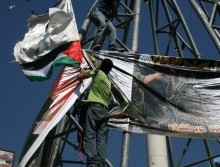 The Palestinian intentions to go to the United Nations for statehood recognition has been strangely slow in being fully pursued. The Arab League has issued support for the Palestinians in some format on three different occasions in the last few months, but each time it has seemed the door remains open for the Palestinians to pull out. Apparent disagreement between at least some in the Palestinian leadership further amplifies the atmosphere of hesitancy. But that doesn’t mean there’s really room to hit the brakes.
The Palestinian intentions to go to the United Nations for statehood recognition has been strangely slow in being fully pursued. The Arab League has issued support for the Palestinians in some format on three different occasions in the last few months, but each time it has seemed the door remains open for the Palestinians to pull out. Apparent disagreement between at least some in the Palestinian leadership further amplifies the atmosphere of hesitancy. But that doesn’t mean there’s really room to hit the brakes.
The US is still trying to get the sides back to talks again and expressing opposition to Palestinian unilateralism. Further, Israeli media, including The Jerusalem Post, has reported that the Israelis are even expressing more openness to making concessions ahead of a renewal of talks in an effort to jumpstart negotiations and head off the UN approach.
However, recent Palestinian rhetoric has escalated the UN statehood matter to what certainly appears to be a point of no return. Comments, including those from Foreign Minister Riyad Al-Malki that were published by the Ma’an News Agency, that the Palestinians will go to the UN regardless of where the peace talks stand have placed Palestinian leaders on record about the issue.
It’s true that the Palestinians say one thing and easily change their minds later—from Prime Minister Salaam Fayyad’s “resignation” threats in 2009 to the recent Hamas-Fatah agreement to form a new Palestinian interim government that has yet to be implemented.
But when it comes to the UN move, the Fatah movement led by Palestinian President Mahmoud Abbas in the West Bank is appearing more and more to be placing all its rhetorical eggs in one basket. Repeated threats to go to the UN if talks are not succeeding have been replaced by expressions of certainty and attempted justifications that the UN move isn’t unilateral and won’t hurt peace talks.
Those justifications are not being accepted by the US and some others, but that hasn’t stopped them. Furthermore, the fact that the Palestinians are now issuing even belligerent rhetoric towards the US even as the US Congress is threatening to reconsider aid to the Palestinian Authority further signals that it’s too late for the PA to pull out of the UN gambit.
For one thing, it would make Abbas’ Fatah party a joke with regards to their political opponent Hamas, who could easily use the PA’s reversal against them—especially since Hamas is opposed to the traditional negotiations approach. But ironically the Arab League’s endorsement of the Palestinian position has further tied the PA’s hands. To pull out now would embarrass and undercut their Arab support—not helpful when the PA is already needing the Arab nations to fulfill their financial aid promises.
Lastly is the Arab Spring protest factor, even though it has not reached the Palestinian public by and large. While a poll published by the Israel Project from Stanley Greenberg of Greenberg Quinlan Rosner Research with the Palestinian Center for Public Opinion said just 4% of Palestinians wanted the UN recognition to be one of the top two priorities for Abbas.
Nonetheless, the rapid deterioration in nations beset by protests gives the entire region the feeling of a powder keg. What if the Palestinian street revolts in the face of the Palestinian leadership reversing its course on the UN? The Palestinian security forces are pretty effective at restraining the public, who don’t seem all that interested in a fight now. But it just took one Tunisian guy setting himself on fire to light up the entire Middle East.
Despite their reasons for likely taking the UN step, that doesn’t mean the Palestinian UN move will be a good one or change all that much on the ground. In fact, the lack of impact from what will likely be a largely symbolic recognition from a number of nations who mostly already support the Palestinians could have the same effect as a dropping of the UN move by the PA leaders.
Further, the step will unnecessarily intensify an already heated debate with Israel over peace talks and will likely make it even harder for the Palestinians to make compromises and concessions. It will probably increase the odds of conflict and make peace even less likely.
In short, the tree the Palestinians have climbed is rotten and could result in disastrous consequences for all involved. But once again the Palestinian leadership has tried to achieve political support through excessively intense rhetoric. As a result, the PA is more likely to fall with the tree than climb down.
(By Joshua Spurlock, www.themideastupdate.com, August 5, 2011)
